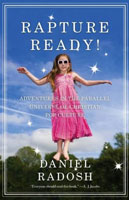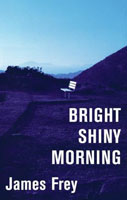 It was just a few weeks ago that I blogged about the interesting piece Daniel Radosh wrote for the New York Times on what he thinks are the top ten Christian songs. Then I read a review of the self-proclaimed secular, liberal Jew’s new book, “Rapture Ready” over at Slate, which intrigued me enough to order it off of Amazon immediately. While it occasionally slips into snarkiness territory, “Rapture Ready” is overall an insightful book that examines Christian pop culture in a way that sadly too many Christians too often have not taken the time to do the same.
It was just a few weeks ago that I blogged about the interesting piece Daniel Radosh wrote for the New York Times on what he thinks are the top ten Christian songs. Then I read a review of the self-proclaimed secular, liberal Jew’s new book, “Rapture Ready” over at Slate, which intrigued me enough to order it off of Amazon immediately. While it occasionally slips into snarkiness territory, “Rapture Ready” is overall an insightful book that examines Christian pop culture in a way that sadly too many Christians too often have not taken the time to do the same.
Radosh’s book is at its best when he is dissecting the crass commercialism that permeates the Christian subculture. He is aghast– rightly so—at the lengths Christians will go to market Jesus and make him fun and accessible to teens, tweens, and anyone else with a little extra cash.
Less impressive are his commentaries about his visit to the massive Cornerstone Festival (the whole examination of Christians at a Christian music fest has been done) and his snide interview with Stephen Baldwin in which—surprise!— the actor comes off sounding pretty foolish. (As a Christian, I have to say that any Baldwin comment is now met with a yawn of resignation.)
Even more disappointing was Radosh’s treatment of sex within the Christian subculture. A mention of someone like author Lauren Winner, or dare I say it, Idol Chatter’s own Donna Freitas, might have brought balance to his commentary.
Still, this book is well-researched for the most part, and deserves to be a great discussion starter in Christian circles. The best question Radosh poses is when he ponders how effective all of the razzle dazzle of Christian pop culture is to bring people to a relationship with Jesus Christ, even though it may be creating a more likable image of Christians. Equally important are his observations on Christian gatekeepers who keep the subculture going at all costs. (However, he fails to mention Hollywood’s desire to also keep the Christian subculture alive through creating special studio brands to market DVD schlock to the churched masses.)
So don’t read this book if you are an easily-offended evangelical or if you own a “Jesus is my homeboy” T-shirt. But for anyone else, this is an intelligent but fun read that will have you thinking twice about what Jesus would buy, watch, or listen to.


